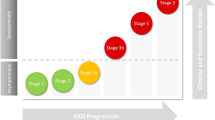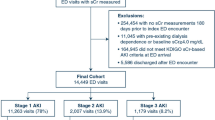Abstract
Background
Inpatient educational programs (IEPs) for patients with chronic kidney disease (CKD) decrease CKD progression. However, patients with end-stage kidney disease who started dialysis during the observation period were excluded from previous studies.
Methods
After adjusting for age, sex, baseline estimated glomerular filtration rate, hemoglobin level, and the presence of diabetes mellitus using 1:1 propensity score matching (caliper width of 0.008) in the groups that did and did not receive an IEP, we compared the time period from the beginning of CKD stage G5 to the start of dialysis and patient characteristics at the start of dialysis.
Results
Prior to matching, 41 patients received an IEP and 260 did not. After propensity score matching, the 41 patients who received an IEP had a longer period from the beginning of stage G5 to the start of dialysis (344 vs. 257 days, P = 0.011), shorter hospitalization period upon the start of dialysis (14 vs. 18 days, P = 0.015) compared with the 41 patients who did not receive an IEP. In addition, the proportion of patients with a planned start of dialysis tended to be higher in the IEP group (95.1 vs. 83.0%, P = 0.077).
Conclusion
An IEP may delay the start of dialysis in patients with end-stage kidney disease, contribute to better preparation of vascular access placement and the smoother start of dialysis.


Similar content being viewed by others
References
Imai E, Horio M, Watanabe T, et al. Prevalence of chronic kidney disease in the Japanese general population. Clin Exp Nephrol. 2009;13:621–30.
Plantinga LC, Boulware LE, Coresh J, et al. Patient awareness of chronic kidney disease: trends and predictors. Arch Intern Med. 2008;168:2268–75.
Ricardo AC, Anderson CA, Yang W, et al. Healthy lifestyle and risk of kidney disease progression, atherosclerotic events, and death in CKD: findings from the Chronic Renal Insufficiency Cohort (CRIC) study. Am J Kidney Dis. 2015;65:412–24.
Chen SH, Tsai YF, Sun CY, et al. The impact of self-management support on the progression of chronic kidney disease. A prospective randomized controlled trial. Nephrol Dial Transpl. 2011;26:3560–6.
Wu IW, Wang SY, Hsu KH, et al. Multidisciplinary predialysis education decreases the incidence of dialysis and reduces mortality–a controlled cohort study based on the NKF/DOQI guidelines. Nephrol Dial Transpl. 2009;24:3426–33.
Yu YJ, Wu IW, Huang CY, et al. Multidisciplinary predialysis education reduced the inpatient and total medical costs of the first 6 months of dialysis in incident hemodialysis patients. PLoS ONE. 2014;9:e112820. https://doi.org/10.1371/journal.pone.0112820.
Machida S, Shibagaki Y, Sakurada T. An inpatient educational program for chronic kidney disease. Clin Exp Nephrol. 2019;23:493–500.
Ueno R, Hatta T, Kawasaki Y, et al. Effect of an educational admission program for patients at the conservative phase of chronic kidney disease (CKD). Nihon Jinzo Gakkai Shi. 2013;55:956–65 (in Japanese).
Matsuo S, Imai E, Horio M, et al. Revised equations for estimated GFR from serum creatinine in Japan. Am J Kidney Dis. 2009;53:982–92.
Eriksen BO, Ingebretsen OC. The progression of chronic kidney disease: a 10-year population-based study of the effects of gender and age. Kidney Int. 2006;69:375–82.
Lei CC, Lee PH, Hsu YC, et al. Educational intervention in CKD retards disease progression and reduces medical costs for patients with stage 5 CKD. Ren Fail. 2013;35:9–16.
Tsubakihara Y, Gejyo F, Nishi S, et al. High target hemoglobin with erythropoiesis-stimulating agents has advantages in the renal function of non-dialysis chronic kidney disease patients. Ther Apher Dial. 2012;16:529–40.
Chen YR, Yang Y, Wang SC, et al. Effectiveness of multidisciplinary care for chronic kidney disease in Taiwan: a 3-year prospective cohort study. Nephrol Dial Transpl. 2013;28:671–82.
Chen PM, Lai TS, Chen PY, et al. Multidisciplinary care program for advanced chronic kidney disease: reduces renal replacement and medical costs. Am J Med. 2015;128:68–766.
Sofue T, Okano Y, Matsushita N, et al. The effects of a participatory structured group educational program on the development of CKD: a population-based study. Clin Exp Nephrol. 2019;23:1031–8.
Imamura Y, Takahashi Y, Hayashi T, et al. Usefulness of multidisciplinary care to prevent worsening renal function in chronic kidney disease. Clin Exp Nephrol. 2019;23:484–92.
Cho EJ, Park HC, Yoon HB, et al. Effect of multidisciplinary pre-dialysis education in advanced chronic kidney disease: propensity score matched cohort analysis. Nephrology (Carlton). 2012;17:472–9.
Kurella Tamura M, Li S, Chen SC, et al. Educational programs improve the preparation for dialysis and survival of patients with chronic kidney disease. Kidney Int. 2014;85:686–92.
Metcalfe W, Khan IH, Prescott GJ, et al. Can we improve early mortality in patients receiving renal replacement therapy? Kidney Int. 2000;57:2539–45.
Bian Z, Gu H, Chen P, et al. Comparison of prognosis between emergency and scheduled hemodialysis. J Int Med Res. 2019;47:1221–31.
Moist LM, Trpeski L, Na Y, et al. Increased hemodialysis catheter use in Canada and associated mortality risk: data from the Canadian Organ Replacement Registry 2001–2004. Clin J Am Soc Nephrol. 2008;3:1726–32.
Lok CE, Foley R, et al. Vascular access morbidity and mortality: trends of the last decade. Clin J Am Soc Nephrol. 2013;8:1213–9.
Li WY, Wang YC, Hwang SJ, et al. Comparison of outcomes between emergent-start and planned-start peritoneal dialysis in incident ESRD patients: a prospective observational study. BMC Nephrol. 2017;18:359.
Acknowledgements
We gratefully acknowledge Yoshiko Ono, Mie Tagaya and Mami Oohori for collecting the data of this study.
Author information
Authors and Affiliations
Corresponding author
Ethics declarations
Conflict of interest
All the authors have declared no competing interests.
Ethical approval
All procedures performed in studies involving human participants were in accordance with the ethical standards of the institutional and/or national research committee at which the studies were conducted (IRB approval number 4344) and with the 1964 Helsinki declaration and its later amendments or comparable ethical standards.
Human and animal rights
This article does not contain any studies with animals performed by any of the authors.
Informed consent
Informed consent was not necessary because of the retrospective nature of the study. Thus, the need for individual written informed consent was waived. However, a declaration of data was published on the website (https://www.marianna-u.ac.jp/houjin/disclosure/clinical-research/marianna/file/ichiran.pdf. Accessed June 16, 2020). The study information was published on the internet, and thus, patients could use the Division of Graduate Student Affairs and Research promotion websites to opt-out of the study if they did not want their data used for research purposes.
Additional information
Publisher's Note
Springer Nature remains neutral with regard to jurisdictional claims in published maps and institutional affiliations.
About this article
Cite this article
Takagi, W.H., Osako, K., Machida, S. et al. Inpatient educational program delays the need for dialysis in patients with chronic kidney disease stage G5. Clin Exp Nephrol 25, 166–172 (2021). https://doi.org/10.1007/s10157-020-01979-5
Received:
Accepted:
Published:
Issue Date:
DOI: https://doi.org/10.1007/s10157-020-01979-5




